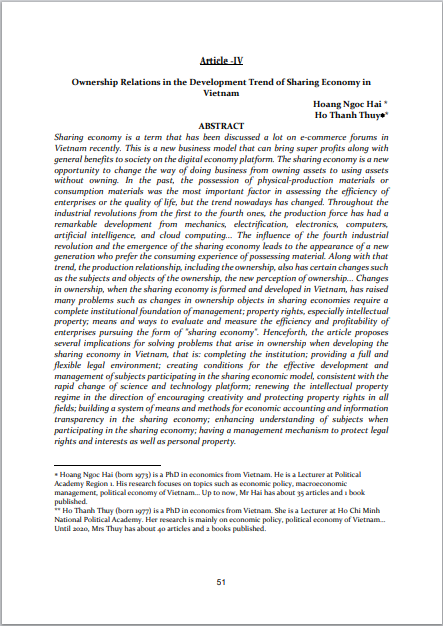Ownership Relations in the Development Trend of Sharing Economy in Vietnam
DOI:
https://doi.org/10.54945/jjia.v1i5.61Keywords:
Sharing economy, ownership, ownership relation, changes in ownership relation, the solutions for VietnamAbstract
Sharing economy is a term that has been discussed a lot on e-commerce forums in Vietnam recently. This is a new business model that can bring super profits along with general benefits to society on the digital economy platform. The sharing economy is a new opportunity to change the way of doing business from owning assets to using assets without owning. In the past, the possession of physical-production materials or consumption materials was the most important factor in assessing the efficiency of enterprises or the quality of life, but the trend nowadays has changed. Throughout the industrial revolutions from the first to the fourth ones, the production force has had a remarkable development from mechanics, electrification, electronics, computers, artificial intelligence, and cloud computing... The influence of the fourth industrial revolution and the emergence of the sharing economy leads to the appearance of a new generation who prefer the consuming experience of possessing material. Along with that trend, the production relationship, including the ownership, also has certain changes such as the subjects and objects of the ownership, the new perception of ownership... Changes in ownership, when the sharing economy is formed and developed in Vietnam, has raised many problems such as changes in ownership objects in sharing economies require a complete institutional foundation of management; property rights, especially intellectual property; means and ways to evaluate and measure the efficiency and profitability of enterprises pursuing the form of "sharing economy". Henceforth, the article proposes several implications for solving problems that arise in ownership when developing the sharing economy in Vietnam, that is: completing the institution; providing a full and flexible legal environment; creating conditions for the effective development and management of subjects participating in the sharing economic model, consistent with the rapid change of science and technology platform; renewing the intellectual property regime in the direction of encouraging creativity and protecting property rights in all fields; building a system of means and methods for economic accounting and information transparency in the sharing economy; enhancing understanding of subjects when participating in the sharing economy; having a management mechanism to protect legal rights and interests as well as personal property.







